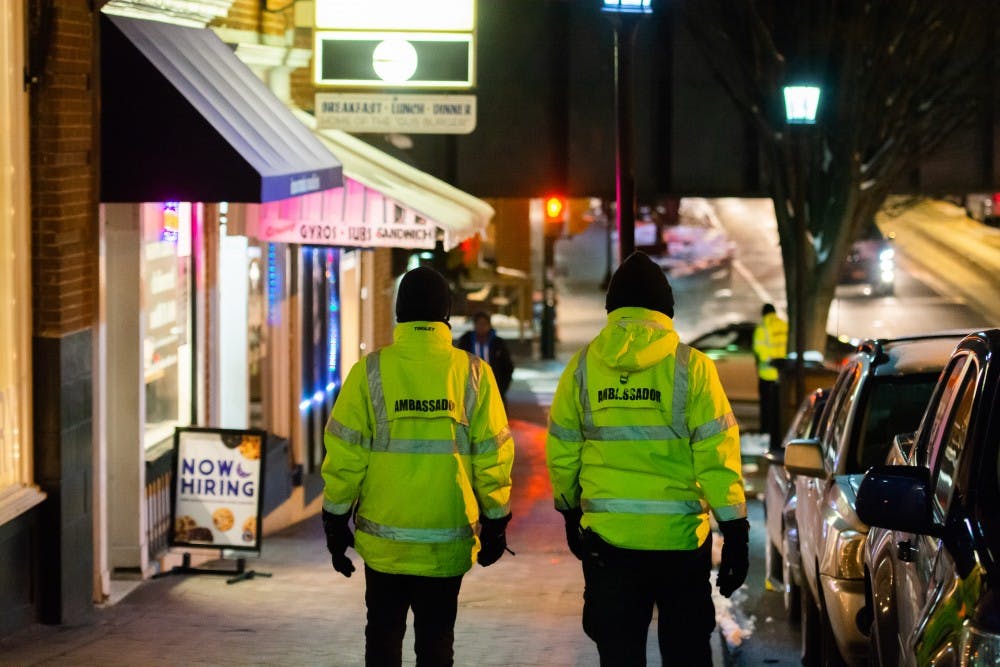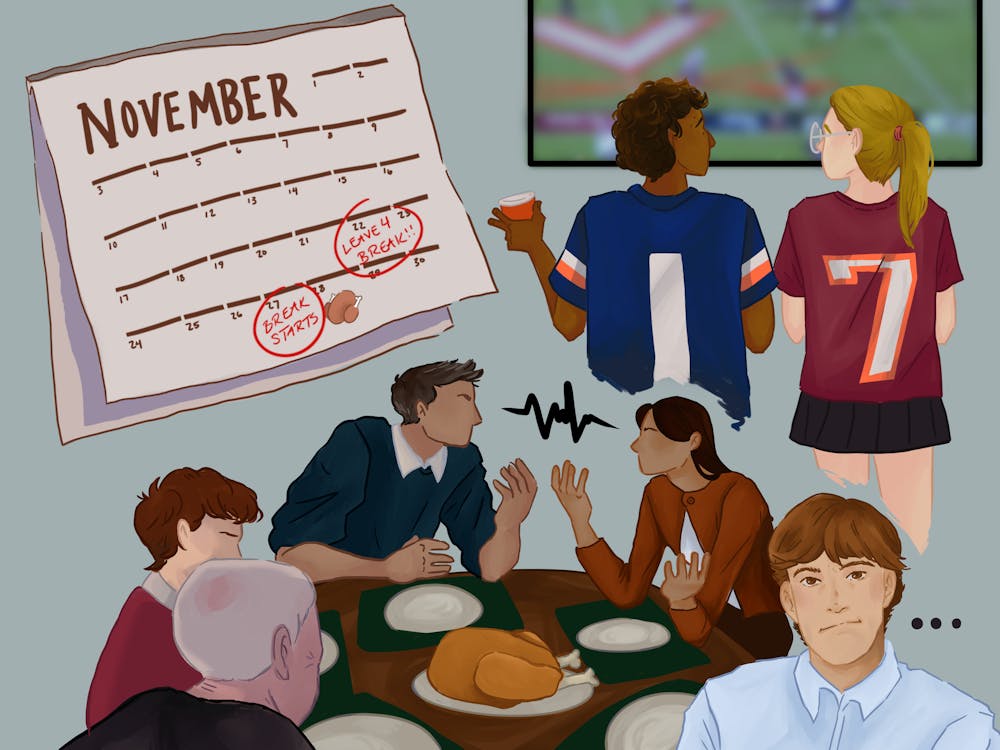In light of a sexual assault that reportedly took place before the start of Ambassador patrol one September evening, a data analysis initiated by the Office of Safety and Emergency Preparedness and feedback from Student Council, the Ambassadors program has recently undergone several changes — but some students argue there is more work to be done.
Coverage start times for two posts have been moved up and five posts have been added. The first change was implemented immediately following an alleged sexual assault at 14th Street and Grady Avenue Sept. 19.
According to an alert sent to the University community the evening of the incident, a female University student reported that an unknown man physically attacked her around 9:30 p.m. that evening near the streets’ intersection. According to the alert, the suspect also sexually assaulted the victim, took her wallet and fled the scene.
In an update sent the next day, Charlottesville Police announced that a suspect, Jowell Travis Legendre, was in custody. Legendre is charged with object sexual penetration, forcible sodomy, robbery, grand larceny and credit card larceny, and is scheduled for a hearing in Charlottesville General District Court Jan. 24.
The incident took place more than an hour before Ambassadors’ 11 p.m. shift began. University spokesperson Anthony de Bruyn confirmed that stationary coverage of 14th Street and Grady Avenue was adjusted to start at 4 p.m. each evening instead of 11 p.m. The shift ends at 7 a.m.
Five stationary posts have been added, including Chancellor Street near the railroad fence-line, 14th Street at the “S” curve, 14th Street between Wertland Street and Sadler Street, Madison Lane between University Avenue and Chancellor Street and 15th Street NW between Sadler Street and Virginia Avenue. All five will be staffed from 7 p.m. to 3 a.m. each evening.
“While these are stationary posts, there may be occasions when an Ambassador needs to relocate due to a developing situation,” de Bruyn said in an email to The Cavalier Daily. “Like most employees, Ambassadors are entitled to periodic breaks. And there may be occasional times when an unexpected absence results in a post not being staffed.”
According to Gloria Graham, the University’s associate vice president of safety and security, Ambassador bike patrol of the Jefferson Park Avenue corridor between Emmet Street and the Jefferson Scholars Foundation has been adjusted to start at 7 p.m. each evening instead of 11 p.m. The shift ends at 3 a.m.
Graham said the changes — not including the immediate 14th Street and Grady Avenue adjustment — resulted from a data analysis of the Ambassadors system spearheaded by the Office of Safety and Emergency Preparedness in September, as well as feedback from Student Council President Alex Cintron, a fourth-year College student.
“[The analysis] looked at the activity of Ambassadors by time of day, day of week, and month,” de Bruyn said in an email to The Cavalier Daily. “We identified certain times of day that could benefit from additional coverage.”
Cintron did not respond to a request for comment.
“To my knowledge we did not have direct say in that process, but we are updated on those kinds of decisions [Ambassadors shift changes] once a month at the University-wide general Safety and Security meetings, which myself and the Buildings and Grounds vice chair attend as representatives of Student Council,” said Katie Kirk, a second-year College student and Student Council Safety and Wellness Committee chair, in an interview with The Cavalier Daily.
Inside the Ambassadors system
The University contracted with security services company G4S to establish the Ambassadors system in 2015. In 2016, another security company — RMC Events — took over the contract from G4S. According to Gloria Graham, the University’s associate vice president of safety and security, the program is funded by the University Police Department’s operating budget.
Ambassadors patrol on-Grounds locations, including the Lawn and vicinity of first-year residence halls, and off-Grounds areas, including Jefferson Park Avenue, the Corner and 14th Street, among other highly student-populated areas. In total, there are 18 posts, covered by foot, car, bike and stationary patrol.
According to a coverage map on the Ambassadors website, foot, car and bike patrol extends from 4 p.m. to 7 a.m. each day throughout Grounds and surrounding areas, the exception being Jefferson Park Avenue, which is covered from 7 p.m. to 3 a.m. According to the map, foot coverage of the Lawn is 24 hours a day, and foot coverage of University Avenue is from 4 p.m. to 7 a.m. Stationary patrol is spread throughout the surrounding off-Grounds areas.
Shawn Jacobson — the Western Virginia regional director for RMC Events — said no one location receiving Ambassador coverage has dealt with more criminal or deviant behavior than another.
“The posts near the corner on Friday, Saturday, and Sunday mornings after 12:00 a.m. tend to have the most activity in terms of medical calls for service, escorts, and police assistance requests,” Jacobson said in an email to The Cavalier Daily.
According to their website, Ambassadors provide information and directions to passersby, identify people in distress and escort individuals. They can alert law enforcement officials of crimes and concerning behaviors, but do not have law enforcement power themselves.
“They can file a police report as a victim or witness, like any other community member,” Jacobson said.
Graham reported that Ambassadors made 1,108 calls for police assistance, provided 1,579 escorts and issued 827 requests for medical assistance in 2017. Safety officials at the University are in the process of compiling Ambassadors data for 2018.
Student leaders analyze system, call for changes
Alongside third-year College student Priscilla Opoku-Yeboah, Kirk co-chairs the newly-minted Police Advisory Board, a Student Council initiative intended to increase communications between students and safety officials and provide input to UPD. Students are invited to express concerns about police and Ambassadors through a survey Cintron sent out with board applications.
The board, which consists of 19 undergraduate and graduate students, met for the first time Nov. 28. Graham and University Police Chief Tommye Sutton attended the meeting as well.
Opoku-Yeboah, a member of the Minority Rights Coalition’s Community Affairs committee, said she came into the role with concerns about the Ambassadors system’s efficacy.
“I live in the Corner area, so normally when you see Ambassadors, they’re just kind of standing around, interacting with the people who work on the Corner, etc.,” Opoku-Yeboah said. “You don’t really know what their purpose is, but I think that having the conversation with the police chief and the people that were there gave me a more concrete explanation as to their effectiveness.”
Opoku-Yeboah said she and other board members hope UPD releases more data and statistics about Ambassadors’ involvement around Grounds.
“That’s something the student Police Advisory Board talked a lot about — making sure information about things like the Ambassadors program were available,” she said.
Additionally, Kirk said the board discussed further development of the program.
“[Graham and Sutton] were really open to looking to how they would expand in the future,” Kirk said. “I believe that’s something we’ll be discussing in our future meetings.”
The board will meet for the second time early spring semester, Kirk said.
Zoe Denenberg, a fourth-year College student and outgoing Inter-Sorority Council president, spearheaded a different data analysis, soliciting feedback on the Ambassadors system and other safety measures from sorority members.
Sent via email Oct. 14, the ISC’s Off-Grounds Student Safety Survey yielded 665 responses in one week. In a letter sent to Graham and Dean of Students Allen Groves Jan. 1 alongside the report, the ISC said many members reported feeling unsafe walking at night.
According to the report, 73 percent of respondents said they believe the University does not provide enough resources to support student safety off-Grounds.
The letter and the report were released to the public Jan. 3, posted on the ISC’s website and Facebook page.
The ISC called on the University to increase the Ambassadors presence along Jefferson Park Avenue and West Main Street, and in areas near the Corner. The ISC also recommended UPD post more information about Ambassadors selection, training and vetting on their website.
Additionally, the ISC urged that the University work with the City of Charlottesville Department of Neighborhood Planning Services to evaluate lighting in areas around the Corner and Jefferson Park Avenue.
Graham and Groves responded to the letter Jan. 4 with their own letter addressed to Denenberg.
“Future adjustments to the coverage areas will be made consistent with our routine review of activity data and as necessary in our continuous efforts to enhance safety,” Graham and Groves wrote.
Student concerns
One day after the 14th Street and Grady Avenue sexual assault, third-year College student Meaghan O’Reilly emailed several University safety officials, asking why there was not an Ambassador stationed at 14th Street and Grady Avenue that evening. O’Reilly noted the area was covered by the Ambassadors, according to their website.
“My email was asking what was being done to address the seeming lapses in Ambassador coverage or how they weren’t really helping or deterring these things from happening,” O’Reilly said in an interview with The Cavalier Daily. “I wanted the administration to give a list of proactive things that they were doing, not just saying, ‘this occurred and now we’re looking into it,’ but what are they doing to stop these things from happening in the first place and be very communicative about the steps that they were taking.”
O’Reilly said Graham responded directly to her email Sept. 21, saying that Ambassadors did patrol 14th Street and Grady Avenue that evening, but not until 11 p.m. But, Graham told O’Reilly, the start time for that post had been pushed forward to 4 p.m.
“[My email] was a day after this occurred, so it was a pretty immediate shift,” O’Reilly said. “[Graham] said police and Ambassadors have been briefed on the incident and were going to be conducting extra patrols throughout the area, and that there had coincidentally already been a meeting set for the next week to discuss the deployment of Ambassadors and assess the need for additional stationary posts.”
Kirk has been fielding feedback this semester. Some students, Kirk said, have expressed concerns that coverage of Jefferson Park Avenue, 14th Street and 16th Street between Grady Avenue and Gordon Avenue is insufficient. She estimated she has received at least 30 comments this semester regarding Ambassadors and police.
“People approach me in all different ways, means, forms,” Kirk said. “I’ve gotten emails, I’ve gotten people who’ve just come up to me on Grounds to talk to me, there’s a more formal setting at the StudCo general body meetings … It’s pretty regular that I hear concerns.”
Eventually, Kirk said she hopes to see the program expand, such that students feel a heavier presence of Ambassadors while walking in the dark.
“I think just expanding the program to make sure that there is enough coverage so that people can be walking home and see at least one Ambassador on their way home [would be good],” Kirk said. “I think that represents a lot of the community concerns we’ve heard thus far this year — the lack of coverage that students feel.”





